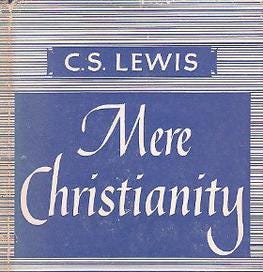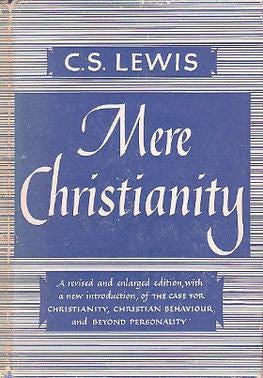Do you believe in God? C.S. Lewis does, and if you want to know what he thinks about it, you can read Mere Christianity.
Mere Christianity is a perfectly adequate book. It’s a series of short chapters in which Lewis presents and justifies his ideas about Christianity. Originally a series of radio talks, it’s written in a conversational style. The points are usually illustrated with simple analogies1, and the prose is winding and a little bit unfocused. Lewis comes back to certain key ideas repeatedly; this is useful if you’re reading the book quickly so you can write a blog post about it, but it also gives the whole thing a fuzzy feel, like he just sat down and wrote what he thought as it came to him. So maybe C.S. Lewis was the first blogger.
Anyways. The arguments are interesting enough, and there’s one that dominates each section of the book, so I’ll walk through them here:
Part 1: “Right and Wrong as a Clue to the Meaning of the Universe”
The main idea here is that humans have a sense of innate right and wrong. Ideas about fairness, propriety, modesty, etc. are consistent (in large part) across cultures and times. Thus, there must be some set of “true” morality that humans are attuned to. Moral norms arise from this underlying sense of true morality.
The existence of this objective morality, Lewis claims, indicates that there must be some kind of creator that made the objective morality. How could it come into existence otherwise? He views this as clear-cut evidence for God, and so this section is mostly riffing on how this “objective” morality proves God exists.
Of course, this isn’t difficult to poke holes in. You can cede the point that objective morality exists without needing God to be the cause of it. It’s not difficult to imagine that these norms are baked into the human brain because they were necessary intuitions to make groups of humans function together evolutionarily. In the same way wolf packs obey certain “objective” social patterns, humans may have certain “objective” intuitions about morality. But this doesn’t imply the existence of a God.
Part 2: “What Christians Believe”
I didn’t get much out of this section. It’s fairly muddled and contains specious arguments like: Jesus said things that only a madman would say. Yet Jesus wasn’t a madman. Therefore, what he said must have been true. Lewis attempts to work from “there must have been a creator of objective morality” to “Thus, here’s why Christianity is true,” in a span of 20 pages. This is more-or-less an impossible task, so it’s not surprising it comes out muddled and slip-shod. That said, it’s still muddled and slip-shod.
A particular greivance: Lewis takes pains to make the claim that God is timeless. That is, he exists outside of time, in all moments at once. This helps resolve the “free will” question2, but it bothered me quite a bit. The God of the Old Testament is very different from the God that Jesus describes. They’re so different that it’s almost impossible to imagine them being the same entity. The God of the Hebrew bible is jealous, murderous, and vengeful. His dominant message is: “If you break God’s commandments, especially the ones about worshiping other gods, you will be painfully put to death.” There’s an approving story in Second Kings about how a new king beheaded all the old king’s sons because their father permitted worship of a rival deity. There’s little of the God I’ve experienced in that. All there is is the most brutal incentive structure imaginable: worship me or die.
The point of Jesus has always been, in my mind, to signal God’s evolution. He takes us away from the cruel, vindictive God of the Old Testament, and brings a new covenant to the people. But if God is timeless–the same entity over all of creation–how are we meant to reconcile the two? How can we have a God who loves prostitutes and tax collectors with a God that eagerly orders death? It doesn’t make sense to me.
Part 3: “Christian Behavior”
This was the best part of the book. Lewis’s thesis is that if we align ourselves with God, moral living becomes easy. He also provides a bunch of practical advice on how to live a more moral life.
Here Lewis’s folksy style is an asset. He’s clearly spent time grappling with these questions, and he’s able to tackle difficult Christian prescriptions with easy, common sense answers.
I found his examination of the command to “Love your neighbor as yourself” especially insightful. Lewis points out that the commandment isn’t “Love all your neighbor does, unconditionally,” it’s “Love your neighbor as yourself.” That is, consider how you treat yourself. You probably regret bad things you’ve done, but you still have a natural self affection and a desire that things go well for you. You should apply that attitude to other people in your life–you don’t have to excuse their bad behavior, but you should acknowledge they’re probably trying their best, and you should hope that they improve in all ways. Essentially it’s “love the sinner, hate the sin,” but explained in a way that makes it feel practicable.
The other sections in the book are similarly useful. He explains a sin in common sense terms, shows why it is bad for you, then provides some useful advice on how to combat it.
This was what I hoped the whole book would be: common sense moral philosophy that provides realistic advice on living it. There’s also the added motivation of “God will help you do this if you give it a good try.”
Part 4: “Beyond Personality”
We’re back to theology here, and again, it’s not very good. There are some interesting points here, but Lewis attempts to tackle some very difficult theological issues, and his homey style just isn’t up to the task. I wasn’t convinced by metaphors and circular reasoning.
Part of the issue is that he takes the view that humans are inherently sinful and flawed, and must give themselves up to God to be saved. This was the Christianity I was brought up with, and I believed it until I mentioned it to the director of the Christian summer camp I worked at in college. She sharply rebuked me, saying “God made me, and I’m good enough. You’re good enough, too.” Ever since, basing Christianity in the notion that we’re all inherently valued creatures has made a lot more sense to me than basing it in the notion that we’re all wretched things in need of salvation.
I think that framing is closer to Jesus’s teaching, as well. A lot of the stuff in this section is built (I think) on theology rather than gospel, and I think that’s a flaw. It comes off feeling very much of the time. It makes sense that a man in the 1950s considers masturbation to be a sin, and worries about overindulgence. But Jesus didn’t talk about those things. Lewis wants his Christianity to be applicable across cultures and time, but it comes off as very much bound to Christian writings outside of the Gospel, especially in this section.
I can’t recommend Mere Christianity. It tries to claim too much without enough justification, and though there’s some interesting insights contained within, it’s unlikely to convince anyone who doesn’t already agree. It would probably be a fulfilling read for someone who ascribes to classic Christianity as Lewis practiced it, but it didn’t do much for someone like me, who identifies as Christian but is skeptical of the doctrine. If someone’s interested in moral philosophy from a Christian lens, I’d recommend The Screwtape Letters, in which Lewis does an excellent job of giving practical advice in an entertaining framework.
e.g.: God is proud of small steps towards righteousness, but expects more eventually—just as a father is proud of his child’s first steps, but would be disappointed by a son who could not walk normally as an adult.
Essentially the reasoning is: Though you’re making choices because you’re constrained by time, God exists at all times and in all places. Thus, it doesn’t make sense for him to “stop” you from doing wrong, because time doesn’t work that way for him. In his reference frame, you’ve done it, are doing it, and will do it, even though you’re still choosing what to do.



